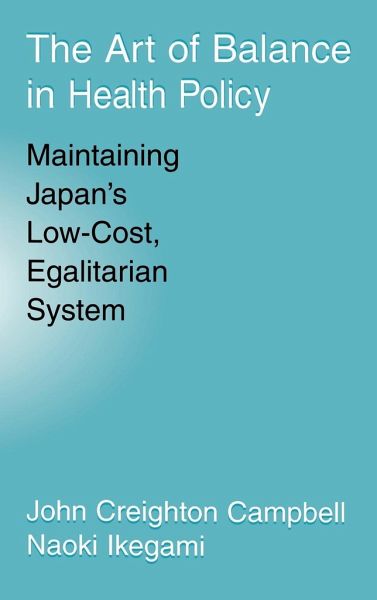
The Art of Balance in Health Policy
Maintaining Japan's Low-Cost, Egalitarian System
Versandkostenfrei!
Versandfertig in 1-2 Wochen
82,99 €
inkl. MwSt.

PAYBACK Punkte
41 °P sammeln!
Compared to the rest of the world, Japan has a healthy population but pays relatively little for medical care. This book analyses how the health care works, and how it came into being. Taking a comparative perspective, the authors describe the politics of health care, the variety of providers, the universal health insurance system, and how the fee-schedule constrains costs at both the macro and micro levels. Special attention is paid to issues of quality and to the difficult problems of assuring adequate high-tech medicine and long-term care. Although the authors discuss the drawbacks to Japan...
Compared to the rest of the world, Japan has a healthy population but pays relatively little for medical care. This book analyses how the health care works, and how it came into being. Taking a comparative perspective, the authors describe the politics of health care, the variety of providers, the universal health insurance system, and how the fee-schedule constrains costs at both the macro and micro levels. Special attention is paid to issues of quality and to the difficult problems of assuring adequate high-tech medicine and long-term care. Although the authors discuss the drawbacks to Japan's stringent cost-containment policy, they also keep in mind the possible implications for reform in the United States. Egalitarian values and a concern for 'balance' among constituents, the authors argue, are essential for cost containment as well as for access to health care.
Table of contents:
Preface; 1. Low health care spending in Japan; 2. Actors, arenas, and agendas in health policy making; 3. Health care providers; 4. The egalitarian health insurance system; 5. The macropolicy of cost containment; 6. The micropolicy of cost containment; 7. The quality problem; 8. Lessons?; 9. Notes.
Compared to the rest of the world, Japan has a healthy population but pays relatively little for medical care. Taking a comparative perspective, the authors describe the politics of health care in Japan, the variety of providers, the universal health insurance system, and how the fee-schedule constrains costs.
Describes the politics and economics of health care in Japan and their implications for the USA.
Table of contents:
Preface; 1. Low health care spending in Japan; 2. Actors, arenas, and agendas in health policy making; 3. Health care providers; 4. The egalitarian health insurance system; 5. The macropolicy of cost containment; 6. The micropolicy of cost containment; 7. The quality problem; 8. Lessons?; 9. Notes.
Compared to the rest of the world, Japan has a healthy population but pays relatively little for medical care. Taking a comparative perspective, the authors describe the politics of health care in Japan, the variety of providers, the universal health insurance system, and how the fee-schedule constrains costs.
Describes the politics and economics of health care in Japan and their implications for the USA.














